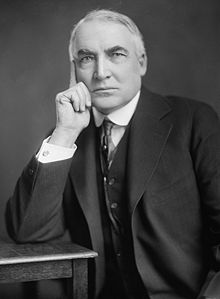Warren Harding
| Warren G. Harding | |
|---|---|
 |
|
| 29th President of the United States | |
|
In office March 4, 1921 – August 2, 1923 |
|
| Vice President | Calvin Coolidge |
| Preceded by | Woodrow Wilson |
| Succeeded by | Calvin Coolidge |
|
United States Senator from Ohio |
|
|
In office March 4, 1915 – January 13, 1921 |
|
| Preceded by | Theodore E. Burton |
| Succeeded by | Frank B. Willis |
| 28th Lieutenant Governor of Ohio | |
|
In office January 11, 1904 – January 8, 1906 |
|
| Governor | Myron T. Herrick |
| Preceded by | Harry L. Gordon |
| Succeeded by | Andrew L. Harris |
| Member of the Ohio Senate from the 13th District | |
|
In office January 1, 1900 – January 4, 1904 |
|
| Preceded by | Henry J. May |
| Succeeded by | Samuel H. West |
| Personal details | |
| Born |
Warren Gamaliel Harding November 2, 1865 Blooming Grove, Ohio, U.S. |
| Died | August 2, 1923 (aged 57) San Francisco, California, U.S. |
| Cause of death | Heart attack |
| Resting place |
Harding Tomb Marion, Ohio, U.S. |
| Political party | Republican |
| Spouse(s) | Florence Kling (m. 1891) |
| Children | Elizabeth Ann Blaesing (with Nan Britton) |
| Relatives | Marshall Eugene DeWolfe (stepson) |
| Alma mater | Ohio Central College |
| Profession | Newspaper editor |
| Religion | Baptist |
| Signature | |
| The Harding Cabinet | ||
|---|---|---|
| Office | Name | Term |
| President | Warren G. Harding | 1921–23 |
| Vice President | Calvin Coolidge | 1921–23 |
| Secretary of State | Charles Evans Hughes | 1921–23 |
| Secretary of Treasury | Andrew Mellon | 1921–23 |
| Secretary of War | John W. Weeks | 1921–23 |
| Attorney General | Harry M. Daugherty | 1921–23 |
| Postmaster General | Will H. Hays | 1921–22 |
| Hubert Work | 1922–23 | |
| Harry S. New | 1923 | |
| Secretary of the Navy | Edwin Denby | 1921–23 |
| Secretary of the Interior | Albert B. Fall | 1921–23 |
| Hubert Work | 1923 | |
| Secretary of Agriculture | Henry C. Wallace | 1921–23 |
| Secretary of Commerce | Herbert Hoover | 1921–23 |
| Secretary of Labor | James J. Davis | 1921–23 |
Warren Gamaliel Harding (November 2, 1865 – August 2, 1923) was the 29th President of the United States, serving from March 4, 1921 until his death in 1923. At the time of his death, he was one of the most popular presidents, but the subsequent exposure of scandals that took place under his administration, such as Teapot Dome, eroded his popular regard, as did revelations of an affair by Nan Britton, one of his mistresses. In historical rankings of the U.S. presidents, Harding is often rated among the worst.
Harding was born in Blooming Grove, Ohio. He lived in rural Ohio all his life, except when political service took him elsewhere. He settled in Marion when not yet 20 years old and bought The Marion Star, building it into a successful newspaper. In 1899, he was elected to the Ohio State Senate and, after four years there, successfully ran for lieutenant governor. He was defeated for governor in 1910, but was elected to the U.S. Senate in 1914.
Harding ran for the Republican nomination for president in 1920, but he was considered an with little chance of success. The leading candidates, such as General Leonard Wood, could not gain a majority to secure the nomination, and the convention deadlocked. Harding's support gradually grew until he was nominated on the tenth ballot. He conducted a front porch campaign, remaining for the most part in Marion and allowing the people to come to him. He won in a landslide over Democrat James M. Cox and Socialist Party candidate Eugene Debs, running on a theme of return to normalcy and becoming the first sitting senator to be elected president.
...
Wikipedia
